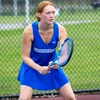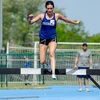 Seeds of alumni involvement in the new science center were germinated during a conference of natural science alumni held on campus in June 2007. Above, left to right at that conference, are Michael Marletta, Professor (Emeritus) Phil Kumler, Jeff Kelly, a student, and Professor Holly Lawson. |
Distinguished SUNY Fredonia alumni from across the United States will convene on campus Thursday as members of the university’s Natural Sciences Advisory Council to participate in the planning phase of the new Science and Technology Center. And while they are here, four members of the council have agreed to generously offer career guidance to lab science students at a noon lunch that day in the Williams Center.
Dr. David Ewing, Dean of Natural and Social Sciences, welcomes the opportunity to tap the minds of these professionals as the university moves forward in designing its first new stand alone academic facility built in 35 years. Their collective expertise is indeed impressive, encompassing science, research, science-technology business and patent law. “All these folks are prominent in their field,” Dr. Ewing said.
Council members will meet with representatives of Mitchel/Giurgola Architects, designers of the $60 million facility to be built adjacent to Houghton Hall, and offer input during the two-hour meeting at the Foundation House.
“We will bring them up to speed on the Science and Technology Center and also elicit their input into what we’re thinking at the present time,” Dr. Ewing explained. Several members offer expertise in planning new buildings at their respective institutions, which he said will be extremely valuable.
High on SUNY Fredonia’s building agenda is a facility design that educates students for the “world of work” they will encounter, Dr. Ewing explained. “These folks have their pulse on different careers in science and know what the trends are, so they are in a good position to advise us. Are we designing the right kind of facility to prepare students for careers in science down the road?”
Already, advisory council members have suggested ideas relating to curriculum and fundraising, among other areas, since the group’s formation at the 2007 Alumni Leadership Conference. Members have advocated both an interdisciplinary approach in teaching science and technology and hands-on experience in the sciences.
“We’re doing quite a bit of (hands on experiences in science) now, but they’re emphasizing the design of a facility that allows for as much of that as possible,” Dr. Ewing said.
Serving on the advisory council are the following:
John Baust, ’65 (doctorate in Physiology, University of Alaska); current director, Institute of Biomedical Technology, lead professor of Biological Sciences and professor, Department of Bioengineering, SUNY Binghamton. Dr. Baust directs multidisciplinary research programs in cryomedicine, including areas such cancer biology, cell/tissue cryopreservation, hypothermic organ preservation and tissue engineering, at the university level and in the biotechnology industry. He has served as President and CEO of Biolife Solutions, Inc. and Cryomedical Sciences, Inc.
Christopher Cahill, ’93 (doctorate in Inorganic Chemistry, SUNY Stony Brook); associate professor of Chemistry, George Washington University, and visiting investigator, Geophysical Laboratory-Carnegie Institution of Washington. Dr. Cahill conducts research into small molecule crystallography, solid state and materials chemistry, geochemistry, the f-elements and the nuclear fuel cycle.
Dennis Costello, ’72 (master’s in Business, Massachusetts Institute of Technology); managing director with Braemar Energy Ventures. Costello has over 30 years of experience in energy and venture capital industries.
Amy Diegelman-Parente, ’95 (doctorate in Bioorganic Chemistry, University of Rochester); assistant professor of Biochemistry, Penn State Altoona. Research interests of Dr. Diegelman-Parente encompass structural-function studies of oligonucleotides and science education.
Deborah Good, ’87 (doctorate in Molecular and Cellular Biology, Northwestern University); associate professor, Virginia Polytechnic Institute and State University. While teaching in the Department of Veterinary and Animal Sciences at the University of Massachusetts-Amherst, Dr. Good developed a strong research program supported by National Institutes of Health grants and over $1 million in federal funding.
Norman Karin, ’76, ’78 (doctorate in Biomedical Sciences, University of Tennessee); senior staff scientist, Cell Biology & Biochemistry Group, Pacific Northwest National Laboratory. Dr. Karin serves on a multidisciplinary research team at Pacific Northwest National Laboratory that is seeking to determine the biological effects of environmental exposure to nanoparticles.
Jeffery Kelly, ’82 (doctorate in Organic Chemistry, University of North Carolina at Chapel Hill); professor of Chemistry and Chairman of Molecular and Experimental Medicine at The Scripps Research Institute. His research focuses on the fundamental chemistry and biology of Protein folding.
Dr. Michael Marletta, ’73 (doctorate in Pharmaceutical Chemistry, University of California – San Francisco); chair, Department of Chemistry at the University of California – Berkeley. Dr. Marletta is a member of the National Academy of Sciences and the Institute of Medicine. His primary research interests lie at the interface of chemistry and biology, with emphasis on the study of protein function and enzyme reaction mechanisms. He is a co-founder of Omniox, Inc.
Christopher Mirabelli, ’77 (doctorate in Molecular Pharmacology, Baylor College of medicine); managing director, HealthCare Ventures; chairman and interim CEO, Proteostatis Therapeutics, Inc. Dr. Mirabelli was a founder of Isis Pharmaceuticals, Inc., where he served in several senior research and development positions, and was a member of SmithKline and French Laboratories R&D Division.
David Mittlefehldt, ’73 (doctorate in Geochemistry, UCLA); scientist, NASA/Johnson Space Center. Dr. Mittlefehldt was a member of three Antarctic Search for Meteorites field teams over a seven-year period and is a principal investigator in NASA’s Cosmochemistry Program and a participating scientist on the Mars Exploration Rover Mission. He gave a commencement address at SUNY Fredonia in 2007 and received an honorary Doctorate of Science degree.
Susan Schall, ’81 (doctorate in Industrial Engineering, Penn State University); president and owner, SOS Consulting, LLC. In a career spanning over 20 years, Dr. Schall has addressed improved performance using engineering, statistical and business process improvement methodologies, including Six Sigma, team-based problem-solving, learn manufacturing techniques, process assessment and strategic planning. Her clients include companies in chemical, food, automotive, industrial supply, education and printing industries.
Steve Schultz, ’72 (J.D., University of Wisconsin Law School); partner in the law firm of Tarolli, Sundheim, Covell and Tummino. Patent prosecution, client counseling and litigation support are the focus Schultz’ practice.
Four council members – Costello, Kelly, Marletta and Mirabelli – will discuss career options and share advice with upper-level students majoring in four lab sciences -- biology, chemistry, geosciences and physics -- at a noon luncheon at the Horizon Room in the Williams Center.
“We are so grateful to have alumni like these who want to help our current students. It’s gratifying and a really important part of the educational enterprise that students get the opportunity to interact with role models,” Dr. Ewing said. “It adds so much to our curriculum.”



